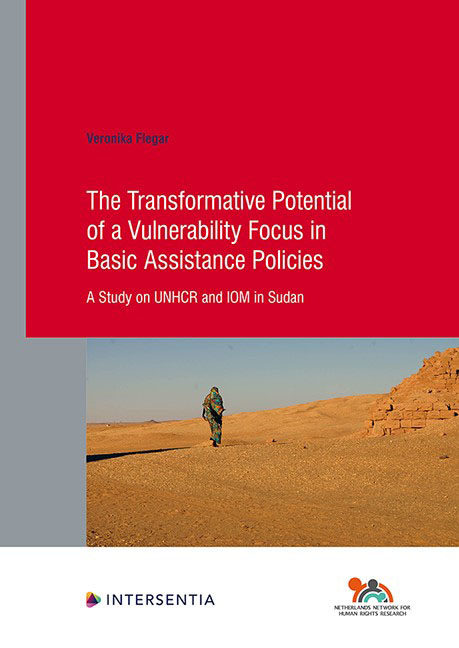 The Transformative Potential of a Vulnerability Focus in Basic Assistance Policies
The Transformative Potential of a Vulnerability Focus in Basic Assistance Policies Book contents
- Frontmatter
- Dedication
- Preface and Acknowledgements
- Contents
- List of Abbreviations
- List of Tables
- List of Figures
- Chapter 1 Introduction
- PART I NORMATIVE AND EMPIRICAL THEORY
- PART II BACKGROUND TO THE CASE STUDIES
- PART III CASE 1: ASSESSING AND ADDRESSING VULNERABILITY AT UNHCR KHARTOUM
- PART IV CASE 2: ASSESSING AND ADDRESSING VULNERABILITY AT IOM KHARTOUM
- PART V
- Bibliography
- Samenvatting
- Summary
- About the Author
- Human Rights Research Series
Preface and Acknowledgements
Published online by Cambridge University Press: 11 November 2021
- Frontmatter
- Dedication
- Preface and Acknowledgements
- Contents
- List of Abbreviations
- List of Tables
- List of Figures
- Chapter 1 Introduction
- PART I NORMATIVE AND EMPIRICAL THEORY
- PART II BACKGROUND TO THE CASE STUDIES
- PART III CASE 1: ASSESSING AND ADDRESSING VULNERABILITY AT UNHCR KHARTOUM
- PART IV CASE 2: ASSESSING AND ADDRESSING VULNERABILITY AT IOM KHARTOUM
- PART V
- Bibliography
- Samenvatting
- Summary
- About the Author
- Human Rights Research Series
Summary
The five years during which I worked on this research, and especially the two years I spent in Sudan, were quite a journey. They allowed me to not only theorise about, but also to experience, feel and see vulnerability and resilience from up close. Precarity, disenfranchisement and very raw human suffering remain wide-spread in Sudan: whether it is the devastated refugees and other migrants that came to visit UNHCR and IOM during my research at these organisations, the displaced and/or disabled persons whom I encountered begging on the streets of Khartoum or the Sudanese protestors and political activists who had been suffering under a repressive regime for decades. Their faces told stories of devastation, but I simultaneously felt like a veil of collective denial had settled upon Sudan: people were careful in voicing any potentially critical opinions and passively underwent sandstorms, floods, incredible heat and draught, political repression and a deteriorating economic crisis that caused currency, bread and fuel shortages. People waited for hours, often even overnight, to receive fuel – apparently without ever complaining openly. Initially, it was hard for me to understand this, what to me seemed like, apathy and I was somewhat disappointed that only very few people would dare to speak up and even fewer would be willing to take action.
How wrong this initial impression was.
In 2019, Sudan witnessed the largest revolution in its history, which toppled long-term president-dictator Omar Al-Bashir on 11 April 2019. I remain deeply humbled by all the Sudanese who found the bravery and strength to stand up, unite and peacefully fight for justice, freedom and democracy. The passion, conviction and determination of the progressive voices in Sudan remains truly inspiring and has shown me what resilience really means. Mobilising and uniting peaceful protestors throughout a hugely divided and dispersed country, maintaining momentum for this movement throughout more than six months despite all government attempts to shut it down, holding a non-stop sit-in protest on a major road in front of the army headquarters for several weeks before and all throughout Ramadan during at least 45°C, recovering and drawing strength from continuous and horrible atrocities committed by military and paramilitary forces and organising large-scale demonstrations and strikes during a complete internet blockout are only some of the incredible examples of this resilience.
- Type
- Chapter
- Information
- The Transformative Potential of a Vulnerability Focus in Basic Assistance PoliciesA Study on UNHCR and IOM in Sudan, pp. vii - xPublisher: IntersentiaPrint publication year: 2020
